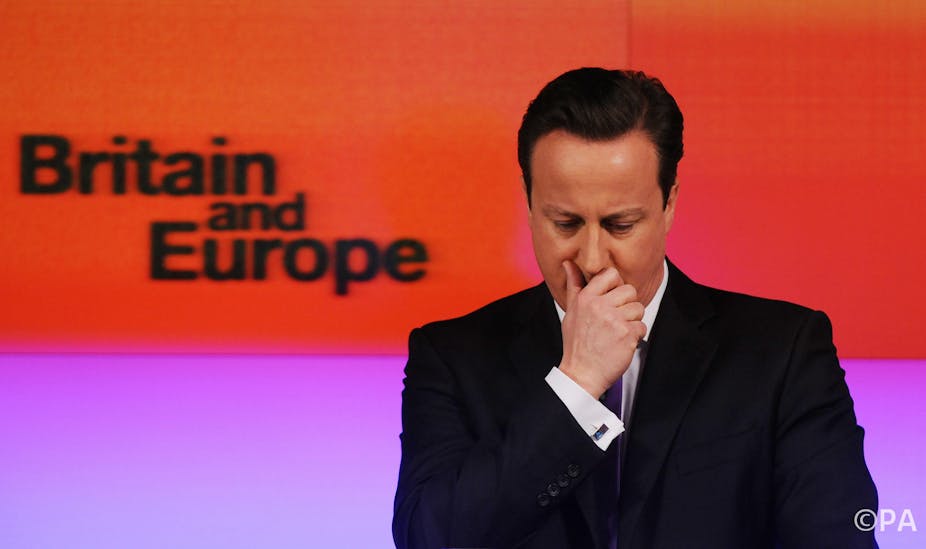There has been in a shift in the way the Conservative party leadership has talked about the European Union over the past fortnight. No longer is the talk of “giving the people a choice” about membership, but rather about reform. This was started by the Europe minister, David Lidington, earlier this month, but it has spread up to David Cameron.
The two positions are of course two sides of the same coin: if the UK can secure reforms that suit it, then a referendum becomes about confirming that new relationship, thereby strengthening it. Indeed, in his key speech on the subject in January, Cameron made exactly this argument. He said: “Europe’s leaders have a duty to hear these concerns. Indeed, we have a duty to act on them. And not just to fix the problems in the Eurozone.” Seen in this light, this shift is one of emphasis, rather than substance, ultimately changing nothing.
However, such a reading would be to miss two basic factors that have shaped (and are shaping) this debate.
Pressure from the right
First, there is the internal dynamic of the Conservative party. As I have argued elsewhere, Cameron’s European policy is driven primarily by the demands of party management. The querulous backbenches have seen an opportunity to pursue a strategy of shoving the leadership into an ever more sceptical position and Cameron has had to respond with his awkward crab-like movements in that direction.
Partly, this is an ideological question. The 2010 intake includes many visceral Thatcherites (even if that term is misleading), for whom anti-Europeanism is a given, with little or no scope for satisfaction for anything less than withdrawal. This attitude has coloured most recent developments, from opt-outs on Justice and Home Affairs, to the European Court of Human Rights (even though the latter isn’t even part of the EU).
At the same time, the issue has been driven by party competition. The rise of UKIP has provoked much concern, especially because the Tories have taken it to be to a party that is just the same as theirs, but with a more “honest” European policy. The evidence actually speaks against this, but that is incidental, since it is the impression that matters. This has given succour to those in the Conservatives who see closing down UKIP’s space on the EU as the key tool for seeing them off, even if it comes at the price of losing voters in the middle of the political spectrum. While that threat might seem to be receding, the fear still largely remains.
Coalition politics do not seem to come into the equation very much: the Lib Dems have been consistent in their pro-EU position and their vetoing of changes to the current government’s policy (hence the January offer to hold a vote in the next parliament). That this has not come to any great consequence for the Tories reflects the general weakness of the Lib Dems prospects in a general election which effectively limits their agency in the matter.
Push for reform in Europe
The second key factor, which has emerged more clearly in recent months, is the constellation of European partners (in both the literal and more euphemistic sense of the word). Where once there was much hesitation about associating with a British government that seemed to be spinning out of control on “Europe”, there has been some movement by counterparts to push for reform agendas.
Activity by the Dutch and the Italians (the latter not normally the most active of member states in such matters) reflects the continuing pressure for Eurozone reforms, particularly given German unwillingness to pursue that agenda this side of this autumn’s federal elections and the subsequent need to keep it alive as an agenda item.
However, it also reflects the desire of other member states to keep the UK inside the EU. The UK remains a valuable liberal counterweight in the system, above and beyond its size and trading importance. With the stabilisation of British policy – however temporary that might prove to be – there is now scope to help ease the path to finding an accommodation for the British.
More prosaically, it is important to acknowledge a deeper truth about European integration: there is no one model of how the system should work. All member states have many views within them about reforming or changing the EU. Seen in that light, the opening up of the possibility of reform is an opportunity to set agendas and future directions. With a Germany currently unwilling (or unable) to take the lead it might seem to positioned to exercise, that makes others more likely to step into the breach.
Seen in the round, the current emphasis on reform is as much a reflection of what is possible, as it is of anything else. Cameron remains very constrained by his party, with limited options afforded by the coalition and other member states. However, if we are to take his January speech at face value, then building some evidence of positive engagement with EU reform is going to be an essential part of gaining concessions in any renegotiation, which in turn will help decide the outcome of a referendum. On such semantic shifts are the fundamentals of public policy decided.

